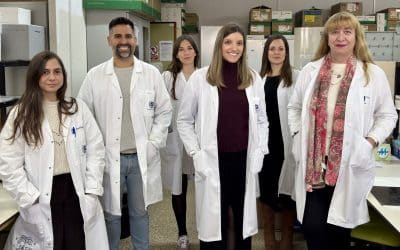The team, which coordinates the international consensus document, uses minimally invasive laboratory testing techniques, using a blood sample from the patient.
The multidisciplinary allergy team of the Malaga Biomedical Research Institute and Nanomedicine Platform (IBIMA Plataforma BIONAND) has published a consensus document, the result of the work of a group of European experts, in which it establishes different recommendations to be taken into account by professionals in the field of allergology when applying the basophil activation test - cells of the immune system involved in these allergic reactions - to diagnose immediate reactions to drugs.
The work has been published in the journal Allergy and is led by researchers from the group of ALLERGIC DISEASES TO PHARMACOTICS AND ALLERGENS, whose responsible researchers are the professor of the University of Malaga and scientific coordinator of the area ‘Autoimmune, Infectious, Inflammation and Allergy Diseases’ of IBIMA Plataforma Bionand María José Torres and Dr. Cristobalina Mayorga, co-investigator responsible for the allergy group.
Drug allergy is a major problem for patients who suffer from it, as it limits treatment options for different diseases and forces the use of alternative drugs that are often less effective, thus having a significant impact on patients' quality of life.
There is now a consensus on the usefulness of the basophil activation test - a very interesting laboratory technique, especially for severe reactions - in the evaluation of immediate drug reactions. However, although studies have been published on its use for different types of drugs, the protocols are not yet fully standardised in terms of cell identification and activation markers, ideal timing, factors influencing basophil activation, as well as drug concentrations and handling. As a result, the technique has not yet been widely used in clinical practice.
The work, published by Dr Cristobalina Mayorga and Dr María José Torres, is based on the current challenge of assessing this type of reaction using methods that are currently being used in the field. in vitro, and has been carried out within a Working Group of the European Academy of Allergy and Clinical Immunology (EAACI) with the participation of experts from different European countries.
Dr Mayorga explains that: ‘in this work we first conducted an opinion survey of professionals who assess patients with immediate drug reactions on the use and usefulness of the basophil activation test for the diagnosis of this disease. Based on the results of this survey and the needs that arose, the working group has produced this consensus document providing a series of recommendations for the use of the technique’.
The basophil activation test represents a safer alternative to drug provocation - a technique that involves giving the patient increasing amounts of the drug to see if a reaction occurs - and in those particular cases where it may be the only diagnostic test available. However, it is noted that, due to the complexity of the drugs, there are no standardised protocols that take into account specific aspects such as the nature of the drugs, the low level of IgE - the main marker used for diagnosis - in the blood or the ability of the basophils to activate, which is necessary for a correct execution and interpretation of the results.
Based on these results, the expert group has made a series of recommendations to guide users of the basophil activation test in assessing immediate drug reactions correctly depending on the type of drug. In this way, the test is more accurately positioned in the diagnostic algorithm. Thus, the standardisation of this technique - to which this study contributes - is important if we want to generalise beyond the individual laboratory and contribute to an accurate diagnosis of patients in the safest possible way.



